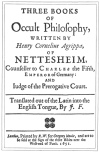
Sacred Texts Esoteric Index Previous Next
Buy this Book at Amazon.com


The Philosophy of Natural Magic, by Henry Cornelius Agrippa, L. W. de Laurence ed. [1913], at sacred-texts.com

Click to enlarge
Title Page of 1651
_______
Seeing there is a Three-fold World—Elementary, Celestial and Intellectual—and every inferior is governed by its superior, and receiveth the influence of the virtues thereof, so that the very Original and Chief Worker of all doth by angels, the heavens, stars, elements, animals, plants, metals and stones convey from Himself the virtues of His Omnipotency upon us, for whose service He made and created all these things: Wise men conceive it no way irrational that it should be possible for us to ascend by the same degrees through each World, to the same very original World itself, the Maker of all things and
[paragraph continues] First cause, from whence all things are and proceed; and also to enjoy not only these virtues, which are already in the more excellent kind of things, but also besides these, to draw new virtues from above. Hence it is that they seek after the virtues of the Elementary World, through the help of physic, and natural philosophy in the various mixtions of natural things; then of the Celestial World in the rays, and influences thereof, according to the rules of Astrologers, and the doctrines of mathematicians, joining the Celestial virtues to the former. Moreover, they ratify and confirm all these with the powers of divers Intelligence, through the sacred ceremonies of religions. The order and process of all these I shall endeavor to deliver in these three books: Whereof the first contains Natural Magic, the second Celestial, and the third Ceremonial. But I know not whether it be an unpardonable presumption in me, that I, a man of so little judgment and learning, should in my very youth- so confidently set upon a business so difficult, so hard and intricate as this is. Wherefore, whatsoever things have here already, and shall afterward be said by me, I would not have anyone assent to them, nor shall I myself, any further than they shall be approved of by the universal church and the congregation of the faithful.